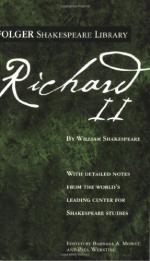|
This section contains 5,071 words (approx. 17 pages at 300 words per page) |

|
SOURCE: Bloom, Allan. “Richard II.” In Shakespeare as Political Thinker, edited by John Alvis and Thomas G. West, pp. 51-61. Durham, N.C.: Carolina Academic Press, 1981.
In the following essay, Bloom traces Richard's downfall from divine-right king and discusses its political consequence for him and his successor, Bolingbroke.
Shakespeare not only presents us with the spectacle of a man becoming a god (Julius Caesar) but in Richard II also permits us to witness a god becoming a man. As a consequence of what one might call political logic, Richard was thought to be, and thought himself to be, somehow divine: to have the right and the capacity to rule men a king ought to have a superior nature, must be a god or the representative of a god; because he must be, he is. The play tells the tale of Richard's unkinging and his agony as he faces...
|
This section contains 5,071 words (approx. 17 pages at 300 words per page) |

|


